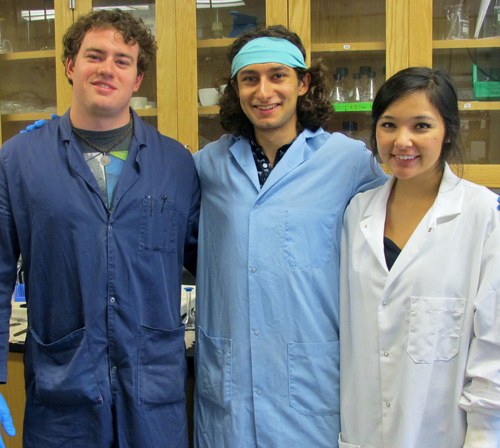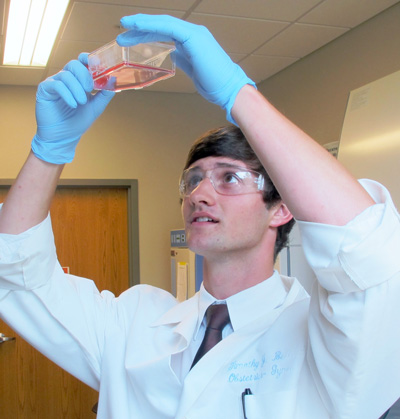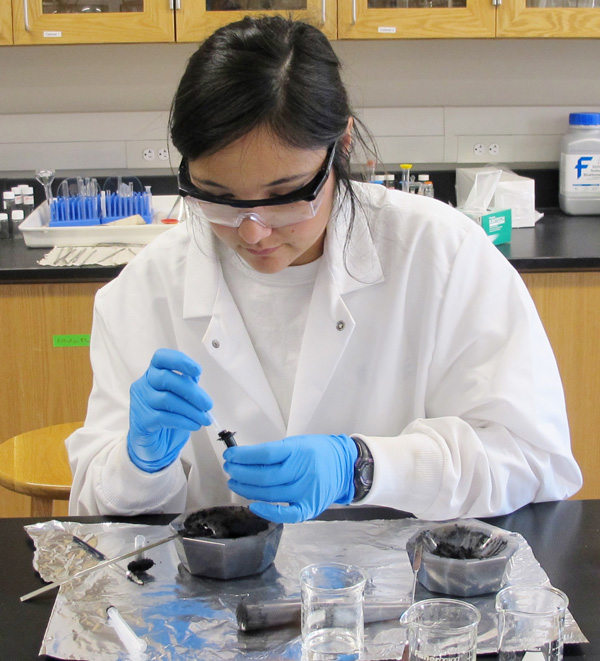Students spend summer researching at Center for Integrative Nanotechnology Sciences
Four majors, three universities, and one common goal brought a group of students together to spend the summer of 2017 at the University of Arkansas at Little Rock Center for Integrative Nanotechnology Sciences (CINS).
Celeste Gibson, Nicolas Maynard, Chris Griffin, and Randy Rainwater pursued an internship at the center for the same basic reason — to help people. All four hope to work in medicine, and they view the mentoring and hands-on experience they’re receiving as crucial parts of their preparation. Private donations and grants are supporting their positions.
Gibson, Maynard, and Griffin are mentored by Drs. Shawn Bourdo and Zeid Nima, CINS staff, and Karrer Alghazali, a doctoral student. For the past two months, the interns have been immersed in the center’s bone regeneration research, learning how to make and analyze implantable scaffolds that may help promote bone growth. However, they’ve also gotten to learn about a range of other nanomaterials applications.
“Every day I get to work on different projects and work with different people,” Gibson said. “I feel like I’m getting the complete experience of CINS. Every day is something new.”
A unique opportunity
This fall, Gibson will enter her second year at the University of Arkansas for Medical Sciences (UAMS). While clinical research at UAMS was an option for the summer, she picked laboratory work at the Center for Integrative Nanotechnology Sciences instead.
“I chose CINS after meeting with (director Dr. Alexandru Biris) and hearing about the projects going on,” Gibson said. “Not fully knowing what specialty I want to pursue for residency, I am able to experience research in many areas of medicine (e.g., bone regeneration, nerves, cancer therapy, etc.) while implementing novel biomedical applications of nanoscience.
“I thought I would get a different … summer research experience than my peers, and I believe I have.”
While the internship is a career stepping stone for Gibson, it is a foundational building block for the other visiting researchers.
Rainwater, the youngest in the group, is an upcoming sophomore at the University of Central Arkansas. For this biology/pre-med major, working at the center means cultivating his academic roots.
“I’m big into learning and doing things outside of my comfort zone,” Rainwater said. “Being fairly young for … other programs, this is helping me get started on the right foot.”

Rainwater is primarily mentored by Emilie Darrigues, a doctoral student at the center. They are investigating the use of nanoparticles to treat pancreatic cancer.
“My favorite part of research has been getting to do things that have never been done before in this field,” Rainwater said. “It’s very satisfying to know you’re making a difference.”
Maynard, who will be a senior at Hendrix College this fall, is also a pre-med major, with an interdisciplinary major in biophysics. Although he considered working at the National Center for Toxicological Research this summer, one visit to the center was enough to hook him.
“Dr. Biris made me feel very welcome and important to the research happening at CINS, even before I was a part of it,” Maynard said.
During this initial visit, Maynard was struck by the creativity and innovation.
“I was attracted to the variety of projects — materials science, regenerative medicine, photovoltaics,” Maynard said. “Anywhere else, I would likely be confined to one project. Here, I can let my mind roam free and explore ideas of my own. That is truly wonderful.”
Like Maynard, Griffin, a recent Hendrix grad, was looking for an opportunity that encouraged innovative thinking.
“I’ve always been fascinated with chemistry and physics,” Griffin said. “However, these disciplines have also always left me feeling disconnected to helping people.”
Griffin chose the center because it gave him the chance to use his physics and chemistry knowledge in a way that could one day aid countless people.
Having earned his bachelor’s degree in chemical physics in May, Griffin will begin earning his master’s degree in chemistry at UA Little Rock this fall.
Engaging students
With its focus on impacting humanity, the Center for Integrative Nanotechnology Sciences has always been an ideal place for budding scientists and medical professionals to learn.

A core element of the center’s mission is engaging students of all ages in nanotechnology, from elementary-schoolers to post-doctoral researchers.
Year-round, the center’s staff members mentor local high school students and give presentations to classes and community organizations. Every summer, the center participates in the Donaghey College of Engineering and Information Technology’s Summer High School Research Program, helping guide students through a three-week research experience.
For many years, the center also partnered with Centre d’Etudes Superieures Industrielles School of Engineering in France to bring students to study at UA Little Rock and CINS for the summer. As a result, numerous students returned to UA Little Rock for their graduate studies — including Rainwater’s mentor, Darrigues.
Whatever their path, working at the center tends to affect people, this year’s interns said.
“CINS has influenced my post-medical school plans,” Gibson said. “I hope to continue to do research as a physician — not just in clinical research, but in basic science research as well.”
Maynard praised the experience he received at the center.
“My work at CINS has made me all the more excited for the future of nanotechnology in medicine,” he said. “I think the mindset I have cultivated here will enable me to innovate solutions to future problems I encounter as a physician.”
Photos by Emily Davis.
